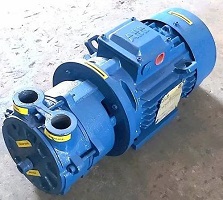Why is my vacuum pump smoking?

Why is my vacuum pump smoking?
A vacuum pump smoking can be caused by a few factors, including oil vapor, overheating, or internal problems. It’s crucial to identify the cause to prevent potential damage or hazards.
Here’s a more detailed breakdown:
۱٫ Oil Vapor:
- In oil-sealed rotary vane pumps, it’s normal to see a “mist” or “smoke” coming from the exhaust, especially when pumping down from atmospheric pressure.
- This is actually oil vaporized due to the pump’s operation and the pressure difference.
- The vapor should decrease as the pressure in the system drops.
- Consider installing an oil mist eliminator on the exhaust to further reduce oil vapor.
۲٫ Overheating:
- Overheating can cause smoke and indicates a potential problem with the motor or other internal components.
- Overheating can be caused by extended use or restricted airflow.
- Ensure the pump has adequate ventilation and that the motor isn’t overworked.
- If the pump is overheating, it may be failing and could lead to premature failure if not addressed.
۳٫ Internal Issues:
- Leaking Pump: A leak, whether internal or external, can cause smoking and other issues.
- Gas Ballast: The gas ballast should be closed when not in use, as it can introduce air into the pump and affect oil levels.
- Contaminated Oil: If the oil is contaminated, it can lead to increased pressure and smoking.
- Internal Blockages: Foreign objects or debris inside the pump can cause smoke and other problems.
- Filter Saturation: Clogged filters, especially exhaust filters, can cause backpressure and smoking.
What to do:
- Check Oil Levels: Ensure the oil level is within the recommended range.
- Inspect for Leaks: Check all connections and seals for leaks.
- Clean or Replace Filters: Clean or replace filters as needed to ensure proper airflow.
- Check Gas Ballast: Make sure the gas ballast is closed.
- Address Overheating: Ensure adequate ventilation and reduce the pump’s workload.
- Consider Professional Help: If you’re unsure about the cause or how to fix it, contact a vacuum pump professional.
Can a vacuum pump run continuously?
What happens when vacuum pump fails?
